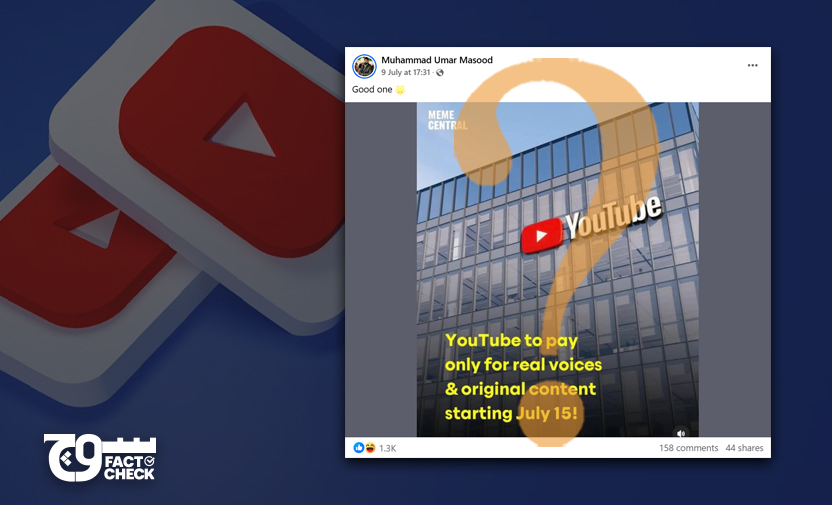
Claim: YouTube has announced that it will “pay only for real voices & original content” starting 15 July 2025, effectively demonetising channels that use artificial intelligence (AI).
Fact: YouTube is not introducing any major changes to its YouTube Partner Program monetisation policy but strengthening it to better identify and flag unoriginal content. The update to the “long-standing” guideline comes into effect on 15 July 2025, the platform has said, explaining that mass-produced or repetitive content “has always been ineligible for monetisation”. However, it clarified that the use of AI tools is allowed for creators to “enhance their storytelling” but that they should follow “monetisation policies” and “disclose when their realistic content is altered or synthetic”.
On 9 July 2025, Facebook user ‘Muhammad Umar Masood’ posted (archive) a visual containing the text, “YouTube to pay only for real voices & original content starting July 15,” against a background showing a building with the video-sharing platform’s logo.
Sourced to “Meme Central,” an India-based page that posted the same on 8 July 2025, the visual is captioned, “Good one 🌟”
Fact or Fiction?
Soch Fact Check looked up if YouTube had announced such a drastic measure but only found news outlets and social media pages rehashing the claim without any official source.
We then searched the @TeamYouTube account on X (formerly Twitter) for any responses and found one shared on 11 July that advises content creators to “clear up some confusion on our minor July 15 YPP update”. The post, which includes a statement available on a Google Support page, adds, “It’s not a new policy – we’re just clarifying [that] our repetitive content policy includes mass-produced content that’s already against the rules.”
Titled “Response to creator questions about YPP policies (July 2025),” the statement authored by TeamYouTube member Sarah reads, “We’ve seen confusion around a minor YPP update coming July 15 and wanted to share more information and answer top questions we’ve seen.” It includes four questions, including:
- “What’s changing on July 15?”
- “Does this relate to Reused Content?”
- “Will using AI in my content be a violation of ‘inauthentic content’?”
- “Can you give some examples of what is considered ‘mass-produced’ content?”
The answer to the first question is: “To be clear, we’re not introducing a new YPP policy. This is a minor update to our long-standing ‘repetitious content’ guideline. We regularly update and evolve our policies based on the content on YouTube and this update is to clarify that this policy includes content that is mass-produced or repetitive, which is content viewers often consider spam. This content has always been ineligible for monetisation, as we’ve always required content to be original and authentic for YPP. We are also renaming this policy from ‘repetitious content’ to ‘inauthentic content’. These guidelines apply regardless of how the content was made.”
The answer to the third question is: “We welcome creators using AI tools to enhance their storytelling and channels that use AI in their content remain eligible to monetise. All channels must follow our monetisation policies and creators are required to disclose when their realistic content is altered or synthetic. More info on how to disclose altered or synthetic content in our Help Center.”
An update at the top of the YouTube Channel Monetisation Policies notes, “There is no change to our reused content policy which reviews content like commentary, clips, compilations, and reaction videos.” The page also specifies that videos include “Shorts, long-form videos, and live streaming.”
On X, @TeamYouTube has issued clarifications multiple times from 3 July to 10 July; these can be viewed here, here, here, here, and here.
We also came across a short video statement by the head of Editorial & Creator Liaison, Rene Ritchie, whose clarification is essentially the same as above.
Soch Fact Check, therefore, concludes that a YouTube Partner Program update to improve the identifying and flagging process for unoriginal content was misleadingly passed off as a major change to the platform’s monetisation policy.
Virality
Soch Fact Check found the claim shared here, here, here, here, and here on Facebook, as well as here, here, here, here, and here on Instagram.
It was also posted on LinkedIn and here, here, here, here, and here on TikTok.
Conclusion: YouTube is not introducing any major changes to its YouTube Partner Program monetisation policy but strengthening it to identify and flag unoriginal content. The update to this “long-standing” guideline” comes into effect on 15 July 2025, the platform has said, explaining that mass-produced or repetitive content “has always been ineligible for monetisation”. However, it clarified that the use of AI tools is allowed for creators to “enhance their storytelling” but that they should follow “monetisation policies” and “disclose when their realistic content is altered or synthetic”.
Background image in cover photo: Muhammad Asyfaul
To appeal against our fact-check, please send an email to appeals@sochfactcheck.com
